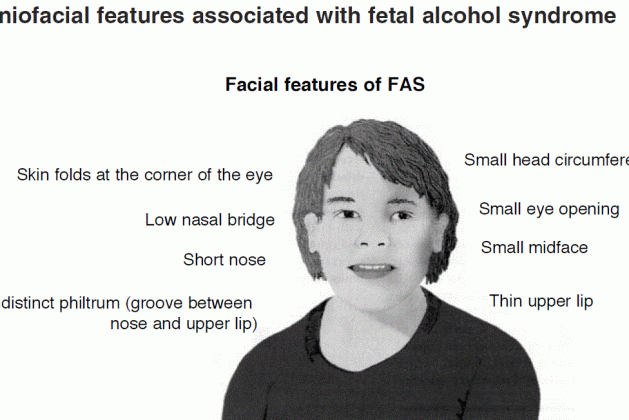
Fetal alcohol syndrome, also known as FAS for short, refers to a pattern of defects, both mental and physical, that can stem from high levels of alcohol use while an unborn child is in the fetal stages. FAS can express itself in a number of ways.
Signs and Symptoms of FAS
FAS can typically be identified not so much by any single sign or symptom, but by a pattern of visual, physical and mental defects. These can include the following:
Smooth philtrum
This is the groove found on the upper lip, between the opening of the mouth and the nose. With heavy prenatal alcohol exposure, this divot may grow flat, rather than pronounced.
Thin upper lip
In individuals who have FAS, the upper lip may be much thinner than the lower lip.
Small eye openings
Many individuals suffering FAS may have narrow eye openings.
These facial features place someone with FAS as mild, moderate or extreme in facial signs of the syndrome. Those with only one feature of FAS are classified as mild, while those with two are regarded moderate and those with three are regarded as extreme cases.
Ranking based on facial features is important. Sterling Clarren of the University of Washington once said in a conference that he had never seen extreme facial signs of FAS without some degree of brain damage being present. Although the facial feature ranking system may seem superficial, and though it is not at all a method of diagnosis as much as it is a way of identifying risk, it is widely regarded as the smoke to fetal alcohol syndrome’s fire.
These signs are linked to gestation. Tissue in early development starts out as brain matter and then becomes your eyes and other parts of the face, particularly the sensory parts of the face. Prenatal alcohol exposure can interfere with this.
Outside of facial signs of FAS, other symptoms and signs may include the following:
Growth deficiency
Below average height and weight can both point to FAS.
Central nervous system deficiencies
The primary feature of FAS, CNS damage is quite common and can express itself in a number of ways ranging from mild structural and/or neurological damage to severe physical disability.
Outside of the above-listed signs and symptoms, FAS has also been linked to a number of cardiac, skeletal, renal and ocular complications, as well as a wide range of uncategorized deformities and cognitive difficulties, such as poor memory and attention deficiency.
Causes of Fetal Alcohol Syndrome
You can tell from the name alone that fetal alcohol syndrome comes from exposure to alcohol while in the fetal stages of development. The actual mechanics of FAS are a little more complex, of course.
The condition sets in when alcohol crosses the placental barrier, resulting in stunted growth, facial stigmata, damaged neurons and brain structure, and stunted weight development.
Bear in mind that while FAS only develops in the fetal stages, consuming excessive amounts of alcohol at any stage of pregnancy can cause serious cognitive and physical difficulties. Development of the child’s brain is not simply “finished” at a certain stage of pregnancy, but rather is ongoing from conception to birth.
Prevention of FAS
Prevention of FAS is wholly in the mother’s hands: don’t drink while pregnant.
Although small amounts of alcohol here and there are not likely to cause any serious harm, even moderate drinking becomes hazardous when pregnancy is added to the mix. A sip of wine or a splash of Bailey’s in your coffee here and there is not likely to cause any real injury, nor will beer-roasted chicken alone lead to FAS, but you want to avoid alcohol as much as possible, and when in doubt, a no-tolerance policy is best. If you’re not sure whether or not something has alcohol in it, don’t drink it.
Management of FAS
As for management, the fact is that FAS does not express itself in just one way.
A child suffering from FAS may or may not be suffering from attention deficit disorder as well. They may or may not have trouble walking, they may or may not be dealing with a speech impediment, they may or may not suffer from mental disabilities.
A child with FAS will likely have their own list of central nervous system-related disabilities, and will have to be dealt with on an individual basis.
For those who are curious about the condition, who are dealing with it or hoping to prevent it, there is more information to be found through the Center for Disease Control’s website.
Learn More about FAS
If a loved one is suffering from Fetal Alcohol Syndrome or is at a risk of getting the disease, it’s important to educate yourself and your surrounding as much as possible. Following are a few links to sites that provide further information.
1) Fetal Alcohol Spectrum Disorders – Centers for Disease Control and Prevention
2) Fetal Alcohol Syndrome – Drinkaware
3) FASlink – Fetal Alcohol Disorders Society
Have you or a loved one faced fetal alcohol syndrome? Share your experience and tips with us in the comments.




Leave a comment
You must login or register to add a new comment.